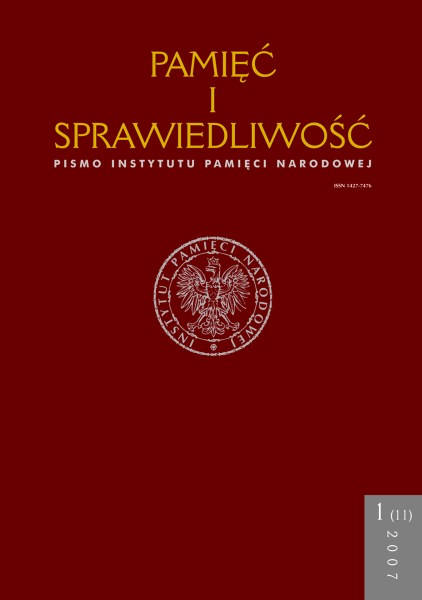Rumunia wobec Praskiej Wiosny
Pamięć i Sprawiedliwość, Tom 11 Nr 1 (2007), strony: 61-73
Data publikacji: 2007-12-30
Abstrakt
The April declaration of 1964 established a practical and theoretical basis for international relationships of Romania. Without it the period between 1965 and 1968 and Romania attitude towards intervention in Czechoslovakia cannot be
understood.
The isolated Romanian efforts within the Soviet block could be even more distinguished in 1967 by two attitudes which put this country in the centre of international attention. The fi rst case was a refusal to carry out Moscow guidelines to break diplomatic relationships with Israel because of the Six-Day 1967 Arab-Israeli
War; the second was recognition of German Federal Republic and visit of its vicechancellor and Minister of Foreign Affairs Willy Brandt in Romania, when Moscow satelite states recognised only German Democratic Republic. After these events Romanian
diplomatic relationships with the free world entered a new stage.
Between 1964 and 1968 the communist regime in Bucharest prepared a set of main rules of the foreign affairs policy. In the activities undertaken in that period one could notice all the elements which were revealed later in August 1968: rejection
of the centre of authority in the communistic movement; the right of decision taking for every party; Warsaw Pact should not be domain of the Soviet Union only; its members should have more power within the organisation; Moscow guidelines concerning foreing affairs policies for members of the Warsaw Pact should be optional, and taking such decisions should be judged by national interest.
Ceauşescu wanted independence combined with the Stalin model of socialism. Dubcek wanted socialism different from the Soviet one, staying under Moscow influence. For the USSR the Czechoslovakian model was far more dangerous: it was an alternative for a Soviet model. That is why in August 1968 ZSRR invaded Czechoslovakia and not Romania. Brezhnev and his comrads wanted to eliminate a team of reformers from Prague and to threaten Ceauşescu concentrating troops at the Romanian border.
Ceauşescu declaration of 21st August 1968 is a benchmark of the peak of his popularity and the culmination point of independence activities of “national communism”. Definitely there were other moments of “riot” in Romania, but none of them had such wide repercussions of condemnation as intervention in Czechoslovakia. Lack of reaction of the Soviet Union shows that “the Soviet Union was not too worried about this kind of insubordination of its vassals, because the core, that is the though control of the society by the party and the Soviet model of developing country was not questioned. In the contrary to China in the middle of the sixties and Cambodia ten years later, these regimes were not dangerous according to Moscow, because they did not create a new model of communism which they would like to defend”.
Inne teksty tego samego autora
- Attila Szakolczai, Aleksandra Matulewska, Droga do rewolucji , Pamięć i Sprawiedliwość: Tom 11 Nr 1 (2007)
- David Silberklang, Aleksandra Matulewska, Refleksje na temat losu Żydów w okupowanej Polsce 1939–1945 , Pamięć i Sprawiedliwość: Tom 12 Nr 1 (2008)
 Język Polski
Język Polski
 English
English
 Deutsch
Deutsch
 Français (France)
Français (France)
 Italiano
Italiano
 Русский
Русский


 PDF
PDF
